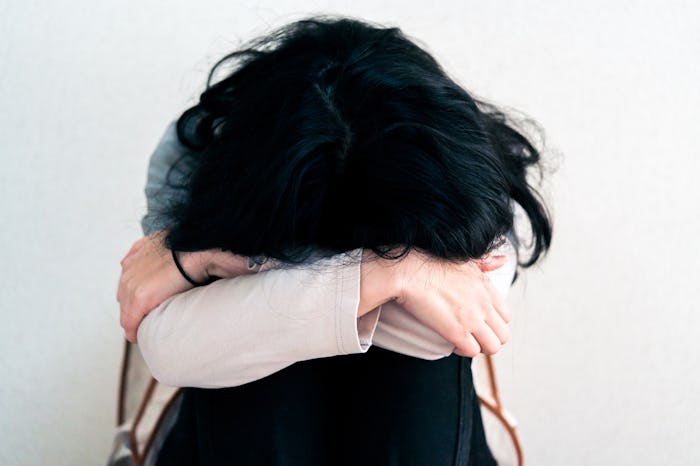Life

7 Ways Lack Of Sleep Can Affect Your Anxiety
If you're feeling more anxious than usual, it may have something to do with your sleep habits. Tossing and turning all night never makes you feel great in the morning, but getting insufficient shut eye can cause more problems than crankiness. There are plenty of ways lack of sleep can affect your anxiety and get you into a bad cycle of not feeling or behaving quite like yourself. Since poor sleep and feelings of anxiousness go hand in hand, it's important to try remedies for both issues to help you get back to a healthier rhythm of better sleep and less anxiety.
Even if you don't normally have feelings related with anxiety, you could still become susceptible to the trap due to your nighttime habits. According to the website for the Anxiety and Depression Association of America, the National Institutes of Health reported that, "more than 40 million Americans suffer from chronic, long-term sleep disorders, and an additional 20 million report sleeping problems occasionally," which means you might find more anxious feelings arising than when you are getting solid slumber.
If you've noticed a link in your sleep and the way it affects your mood, these seven ways lack of sleep affects your anxiety will show you how the connection between the two plays out.
1It Makes You Worry More
If you haven't been sleeping well, you may notice there's more negative thoughts on your mind. "Scientists have found that a lack of sleep, common in anxiety disorders, may play a key role in activating brain regions that contribute to excessive worrying," the website for Pysch Central reported.
2It Causes You To Dread Things
Even if you don't normally struggle with anxiety, not getting enough shut eye could trigger anxiety. Men's Fitness magazine reported that the Journal of Neuroscience discovered that sleep deprived people experience more of what's called anticipatory anxiety, which is that feeling you get when dreading something such a big test or presentation.
3It Can Make For A Larger Problem
It's common for sleep problems to be a by-product of anxiety disorders, but for those who have an ongoing problem with sleep, larger problems may grow from there. According to the website for the Anxiety and Depression Association of America, "new research suggests sleep deprivation can cause an anxiety disorder." Which shows how susceptible we all are to this risk.
4You Don't Get Relief
Not having a chance to catch up on your sleep can exacerbate your anxiety. When your body doesn't get the relief of a good night's sleep, neither does your mood, stress, and anxiety, as the website for Harvard Medical School's Get Sleep page reported. This makes the problem ongoing and more difficult to manage.
5It Starts A Vicious Cycle
The round and round of poor sleep and anxiousness can be a difficult cycle to break. As Everyday Health reported, the less sleep you get, the more anxiety arises and the more anxiety you have, the harder it is to get some sleep. This circle of sleep and anxiety can be broken by dealing with both pieces of the puzzle: lowering anxiety and focusing on good sleep habits.
6It Makes You Relationships Tense
The combo of no sleep and increased anxiety can play out in all aspects of your life. As Psychology Today reported, mood changes brought on by sleep deprivation can negatively effect your romantic relationships, because you essentially aren't acting like yourself.
7It Increases Existing Symptoms
Lack of sleep can directly effect the degree to which you experience anxiety. If you already experience anxiety, not getting enough shut eye can increase your feelings of anxiousness, according to Health Central's website.